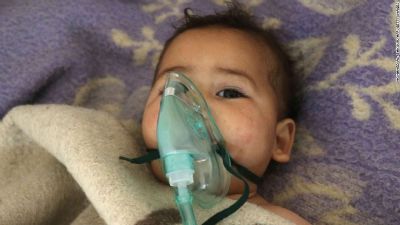Dozens of people, including at least ten children, have been killed and more than 200 injured in a suspected chemical attack in northern Syria, multiple activist groups said.
Airstrikes hit the city of Khan Sheikhoun in Idlib province at 6:30 a.m. Tuesday, giving off a "poisonous gas," according to Anas al-Diab, an activist with the Aleppo Media Center.
The casualties reportedly came as a result of asphyxiation caused by exposure to an unknown gas or chemical agent.
Five minutes later, three more strikes hit the same city center location but did not result in any gas, al-Diab added.
Videos circulating on social media purporting to be from the scene show people, including children, who appear unresponsive; others are seen struggling to breathe or wearing oxygen masks.
Doctors are attempting to evacuate the wounded to Turkey, according to activists.
The Aleppo Media Center later reported that several people were injured when an airstrike hit near a hospital in Khan Sheikhoun where victims from the earlier apparent gas attack were being treated.
There were no deaths reported from the airstrike near the hospital.
The nature of the substance used in the Tuesday attack has not been confirmed, and it is unclear if the planes involved were Syrian.
Idlib province is largely controlled by an alliance of Syrian rebel forces and is regularly targeted in airstrikes by the Syrian government and its ally, Russia.
There are varying reports on the death toll from the airstrikes on Tuesday.
Activist al-Diab said the death toll was at least 67, while activist group Idlib Media Center reported that dozens were killed. Elsewhere the UK-based Syrian Observatory for Human Rights said at least 58 were dead, including ten children.
In a tweet the Syrian White Helmets suggested 50 were killed and more than 300 injured.
The High Negotiations Committee, an umbrella opposition group, claimed the death toll could be as high as 100 with up to 400 injured.
Activist groups have blamed the Syrian regime of President Bashar al-Assad for the attack.
The Syrian Coalition, an umbrella opposition group, referred to the attack in a Twitter post as a "crime similar to that in Eastern Ghouta in 2013 that the international community allowed to pass without accountability or punishment."
The tweet was referring to a 2013 chemical attack on a Damascus suburb blamed on the Syrian regime.
US Republican Sen. John McCain also apparently referred to the 2013 attack Tuesday, telling CNN: "We've seen this movie before -- it was when Barack Obama said they would have a red line, [the regime] crossed it, and he did nothing. Bashar Assad and his friends, the Russians, take note of what Americans say."
McCain called for US President Donald Trump -- who is yet to comment on what happened Tuesday -- to say "we're going to arm the Free Syrian Army, we're going to dedicate ourselves to the removal of Bashar Assad, we're going to have the Russians pay a price for their engagement."
McCain added: "The Iranians and Hezbollah are also heavily involved. All players here are going to have to pay a penalty, and the United States of America is going to be on the side of people who fight for freedom, and we will not sit by and watch chemical weapons being used to slaughter innocent women and children."
The August 2013 attack in Ghouta prompted then-President Barack Obama to ask Congress to authorize military action against Syria.
Shortly after, Syria agreed to a Russian proposal to give up control of its chemical weapons, leading Obama to quietly retreat from threats of military action against the regime.
The US says more than 1,400 civilians may have been killed in the 2013 gas attack.
The United Nations has since said that there is "overwhelming and indisputable" evidence that the nerve gas sarin was used on a "relatively large scale" in the Damascus suburb.
Since the war began in 2011, an estimated 400,000 Syrians have been killed, according to figures issued by the UN last year.
The news from Idlib Tuesday came as an international conference opened in Brussels Tuesday to discuss the future of Syria.
It is being hosted by the European Union and co-chaired with the UN and with the governments of Germany, Kuwait, Norway, Qatar and the United Kingdom.
April 4, 2017
Syria Gas Attack Kills Dozens, Including Children
Date
April 4, 2017
Title
Syria Gas Attack Reportedly Kills Dozens, Including Children,
CNN
Author(s)
Kareem Khadder, Schams Elwazer, Elizabeth Roberts, Eyad Kourdi and Jomana Karadsheh
Original Source

